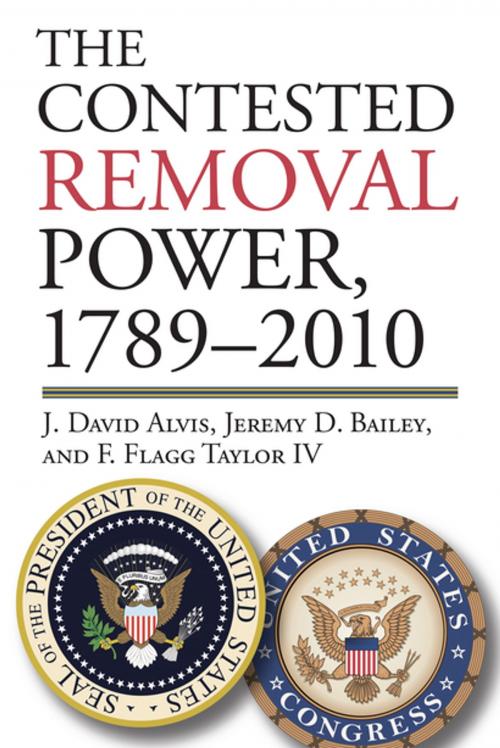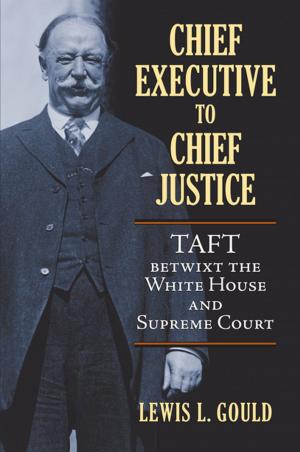The Contested Removal Power, 1789-2010
Nonfiction, Social & Cultural Studies, Political Science, Government| Author: | J. David Alvis, Jeremy D. Bailey, A01 | ISBN: | 9780700619771 |
| Publisher: | University Press of Kansas | Publication: | April 11, 2014 |
| Imprint: | University Press of Kansas | Language: | English |
| Author: | J. David Alvis, Jeremy D. Bailey, A01 |
| ISBN: | 9780700619771 |
| Publisher: | University Press of Kansas |
| Publication: | April 11, 2014 |
| Imprint: | University Press of Kansas |
| Language: | English |
Choice Outstanding Title
The U.S. Constitution is clear on the appointment of executive officials: the president nominates, the Senate approves. But on the question of removing those officials, the Constitution is silent—although that silence has not discouraged strenuous efforts to challenge, censure, and even impeach presidents from Andrew Jackson to Bill Clinton. As J. David Alvis, Jeremy D. Bailey, and Flagg Taylor show, the removal power has always been and continues to be a thorny issue, especially as presidential power has expanded dramatically during the past century.
Linking this provocative issue to American political and constitutional development, the authors recount removal power debate from the Founding to the present day. Understanding the historical context of outbreaks in the debate, they contend, is essential to sorting out the theoretical claims from partisan maneuvering and sectional interests, enabling readers to better understand the actual constitutional questions involved.
After a detailed review of the Decision of 1789, the book examines the initial assertions of executive power theory, particularly by Thomas Jefferson and Andrew Jackson, then the rise of the argument for congressional delegation, beginning with the Whigs and ending with the impeachment of Andrew Johnson. The authors chronicle the return of executive power theory in the efforts of Presidents Grant, Hayes, Garfield, and Cleveland, who all battled with Congress over removals, then describe the emergence of new institutional arrangements with the creation of independent regulatory commissions. They conclude by tracking the rise of the unitarians and the challenges that this school has posed to the modern administrative state.
Although many scholars consider the matter to have been settled in 1789, the authors argue that a Supreme Court case as recent as 2010—Free Enterprise Fund v. Public Company Accounting Oversight Board—shows the extent to which questions surrounding removal power remain unresolved and demand more attention. Their work offers a more nuanced and balanced account of the debate, teasing out the logic of the different institutional perspectives on this important constitutional question as no previous book has.
Choice Outstanding Title
The U.S. Constitution is clear on the appointment of executive officials: the president nominates, the Senate approves. But on the question of removing those officials, the Constitution is silent—although that silence has not discouraged strenuous efforts to challenge, censure, and even impeach presidents from Andrew Jackson to Bill Clinton. As J. David Alvis, Jeremy D. Bailey, and Flagg Taylor show, the removal power has always been and continues to be a thorny issue, especially as presidential power has expanded dramatically during the past century.
Linking this provocative issue to American political and constitutional development, the authors recount removal power debate from the Founding to the present day. Understanding the historical context of outbreaks in the debate, they contend, is essential to sorting out the theoretical claims from partisan maneuvering and sectional interests, enabling readers to better understand the actual constitutional questions involved.
After a detailed review of the Decision of 1789, the book examines the initial assertions of executive power theory, particularly by Thomas Jefferson and Andrew Jackson, then the rise of the argument for congressional delegation, beginning with the Whigs and ending with the impeachment of Andrew Johnson. The authors chronicle the return of executive power theory in the efforts of Presidents Grant, Hayes, Garfield, and Cleveland, who all battled with Congress over removals, then describe the emergence of new institutional arrangements with the creation of independent regulatory commissions. They conclude by tracking the rise of the unitarians and the challenges that this school has posed to the modern administrative state.
Although many scholars consider the matter to have been settled in 1789, the authors argue that a Supreme Court case as recent as 2010—Free Enterprise Fund v. Public Company Accounting Oversight Board—shows the extent to which questions surrounding removal power remain unresolved and demand more attention. Their work offers a more nuanced and balanced account of the debate, teasing out the logic of the different institutional perspectives on this important constitutional question as no previous book has.















